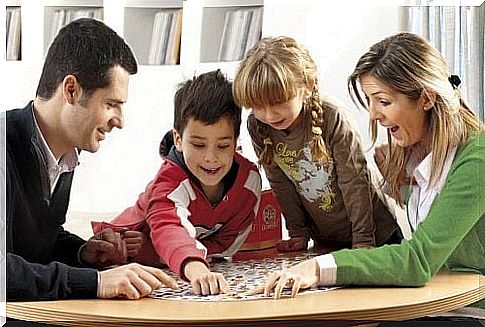5 Games To Stimulate Active Listening In Children

Do your kids listen to you or just listen to you? In fact there is a difference. They definitely listen to you, the problem is that they don’t pay attention and don’t care what you say. Fortunately, they are children and they love to play. Therefore, we present you 5 games to stimulate active listening in children in a pleasant and fun way.
How do games work to encourage active listening?
These games are based on different guidelines that children should follow. If they don’t pay attention, they won’t be able to develop the games well. It can be useful for children who have difficulty concentrating, but it can also be helpful for those who have language difficulties.
Sometimes giving an order is not enough: you have to give examples of how to play. If you have to demonstrate several times to get the idea, that’s no problem.
Reinforce a positive attitude through motivation and support. It is recommended that you or another adult participate in the game, so that you can keep the thread of the action. If at any point the children get distracted and stop playing, you can intervene so they don’t lose interest.
If after several attempts you notice that one of the children cannot understand the game, try again at another time or start another activity. It is possible that this particular child needs more attention or another type of technique.
5 games to stimulate active listening
Joke: “The master sent it”
Children should be told that they need to take an action after hearing the phrase “The master told them to”. So you will say to them, for example: “The master told us to touch our nose”; “The master ordered the right foot to be raised”, or other such phrases.
- You can make the game a little more complex by asking them to play with their eyes closed.
- You can also try saying what they should do without first saying the phrase “The master told you to”. If they’re really listening, they shouldn’t take the action.

Joke: “Fruit Salad”
Prepare cards with fruit images. Have the children stand in a circle and give each one a piece of fruit. Point out two fruits at a time, for example orange and apple.
Children with these fruits should change places. Before starting, explain that when you say the phrase “Fruit salad”, everyone must switch places.
- Increase the difficulty by removing the cards when they have already memorized.
- Vary the game by changing the children’s cards after several rounds so they will have to be more attentive.
Joke: “Listen attentive”
This activity is very simple, but it keeps the children’s interest alive. Read a short story or story and ask them to take a certain action whenever you say a specific word.
- For example, whenever you say the name “Mary”, they should lift their right leg.
- Make the game more complex by specifying more words and more actions each time you repeat those words.
Joke: “The hat of speech”
Set aside these materials: dialogue-themed cards, a hat, and an hourglass (this is optional, you can also use your watch’s stopwatch). Ask the children to form a semicircle and face them. The game consists of giving the hat to a child and asking him to choose one of the cards.
The child should talk about the chosen topic for a minute and then pass the hat to another child, so that they choose another card and repeat the process. While waiting their turn, the rest of the children must remain silent.

Joke: “I went to the fair and bought”
This is a very fun and dynamic activity. It consists of starting with the phrase “I went to the market and bought…” followed by another word, for example: “I went to the market and I bought an apple”.
Then the child on your right should continue the sentence by adding one more word and repeating the entire sentence. It would look like this: “I went to the fair and bought apples and bananas”.
- Then it would be the turn of the next child, who should repeat what was said previously and add a new word, and so on.
- The game ends when the sentence becomes too long and it is very difficult to repeat the entire sentence.
- If a child gets stuck and you don’t know what to say to continue the sentence, you can help by asking a question or giving a clue. For example: “After red comes yellow”.
Dynamics of games
It doesn’t matter which games to stimulate active listening you choose. The aim is to keep the children’s interest alive. If you notice that at some point the group’s animation is waning, change the game or reverse roles.
After a while, children will become more involved in the games and progress will be more evident. Figure out which activity motivates them the most and try to make variations to keep the kids interested.









